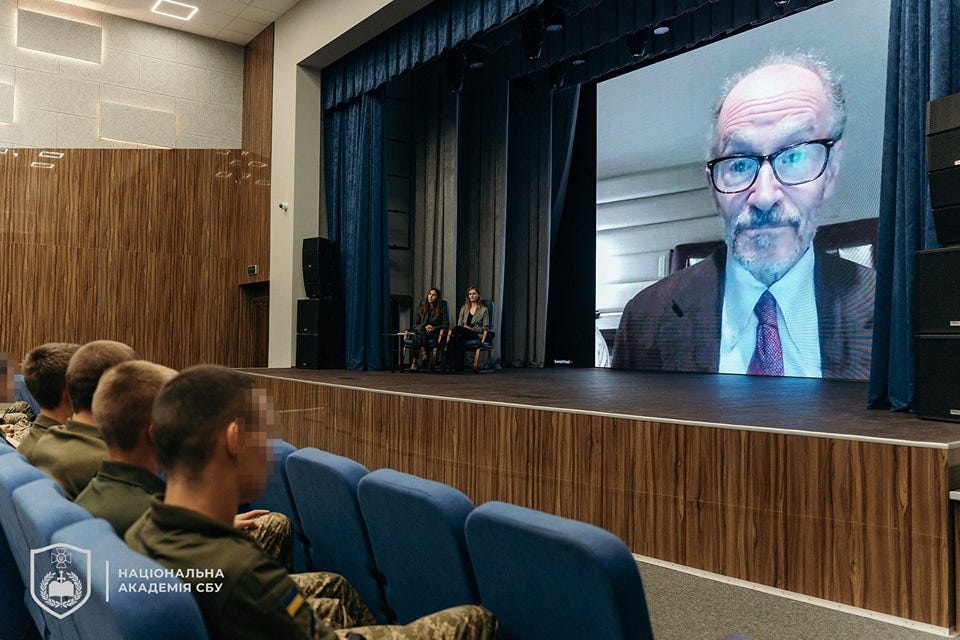(Note to subscribers: Substack says this post is “too long for email,” not because of the word count, but the numerous images and hyperlinks. Anyway, I always recommend opening my posts in your browser, because after publishing them I often make further edits, which won’t appear in your inbox.)
In the spring of 2021, after the initial buildup of Russian troops near Ukraine’s borders, a small group of Ukrainian nationalists established a think tank that started to work with the Ukrainian armed forces. Since then, the “Ukrainian Security and Cooperation Center” (USCC) has partnered with the European Congress of Ukrainians, an important structure in the Toronto-based Ukrainian World Congress, and the National Academy of the Security Service of Ukraine, which is more or less the equivalent of the FBI Academy in Quantico, Virginia.
According to the website of the Security and Cooperation Center, its core team took shape in 2014, during the so-called “Revolution of Dignity.” But the leadership of this “independent analytical center” actually originated in the OUN-B—the “Banderite” faction of the Organization of Ukrainian Nationalists, which still exists—and its “Turn off Russian” campaign that advocated for the elimination of Russian influence in Ukrainian media. Zelensky’s crackdown in early 2021, that aimed to accomplish this, reportedly triggered Putin’s decision to amass troops in the coming weeks.
That’s roughly when the “Turn off Russian” team established the USCC, which now claims, “We helped to shut down the TV channels owned by Medvedchuk.” They might have parted ways with the Banderites since 2019, but they could also be laying the groundwork for regime change in the OUN-B. Whatever the case may be, it’s worth keeping an eye on this group. A representative of the USCC even appears to coordinate the fundraising arm of an elite neo-Nazi unit directed by the Ukrainian military intelligence agency.
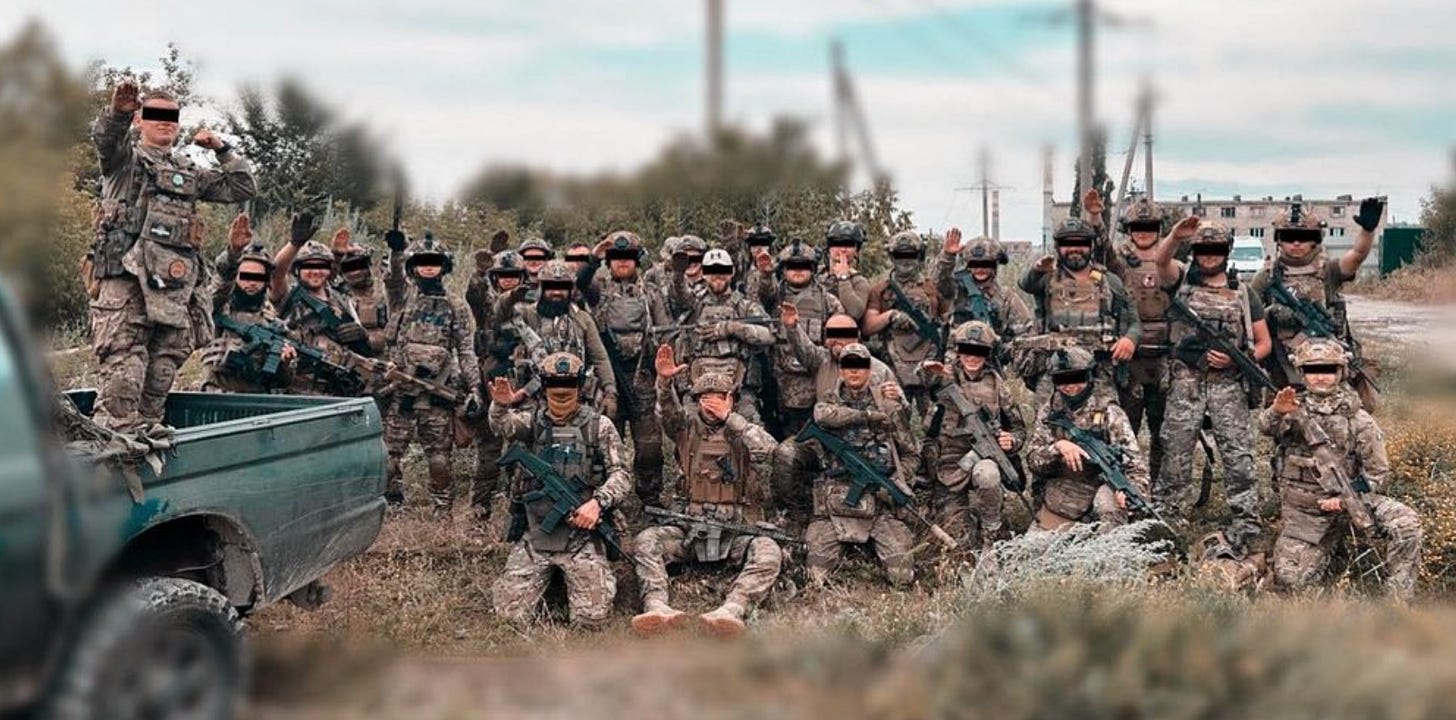
Security and Military Cooperation Center
The USCC got started with a video that it made with the Special Operations Forces of Ukraine to support draft law 5557 “On the Fundamentals of National Resistance.” Soon the Center interviewed the commanders of the Special Operations Forces (Hryhoriy Halahan) and the Territorial Defense Forces (Anatoliy Barhylevych) about this important legislation. “We are talking about the historical past,” said Halahan, whom Zelensky dismissed a year later. “How can we do what we did in the Ukrainian Insurgent Army,” he asked, referring to the 1940s paramilitary arm of OUN-B.
As the summer of 2021 came to an end, the USCC published an interview with Kyrylo Budanov, about a year after he began to head the Main Directorate of Intelligence (HUR, Holovne Upravlinnya Rozvidky) in the Ministry of Defense. According to the USCC communications director, it was Budanov’s “first major interview” since his appointment as HUR chief. It aired on the 29th birthday of Ukraine’s military intelligence agency. The day before, the HUR website published an essay by the executive director of the USCC: “Ukrainian Intelligence or How the Wise Dominates the Stars.”
From 2021-23, the head of the analytical department of the USCC is said to have “led a group that prepared for Ukrainian defense agencies an analysis of possible threats from Russia and social changes in the Russian Federation.” Meanwhile, her husband, the USCC chairman, served as an advisor to the Ministry of Defense and in that capacity gave interviews to the New York Times, the BBC, The Guardian, The Economist, the Financial Times, and other publications, resembling a spokesperson for the Ukrainian government. “We have to prepare for the darkest scenarios,” he told a Romanian newspaper. “Therefore, we will not stop, we will not give in, even if the Kremlin uses nuclear weapons.”
In early 2022, the communications director of the USCC started to do media work for the Territorial Defense Forces. Since then, the humanitarian wing of the USCC has partnered with the fundraising arm of the HUR’s elite Kraken regiment, which is an openly neo-Nazi unit affiliated with the Azov movement. This year, the USCC signed a memorandum of cooperation with the National Academy of the Security Service of Ukraine. That is how Lubomyr Luciuk, a notorious Canadian Banderite, came to lecture its students in the spring. After all, this think tank is rooted in the international OUN-B network.

Origins of the USCC
Readers of my unfinished series on the “Capitulation Resistance Movement” may recall that the OUN-B created that campaign in 2019 via several Banderite “facade structures,” most importantly the far-right Youth Nationalist Congress (MNK, Molodizhnyy Natsionalistychnyy Konhres) and its “Free People” network, which was repurposed several times. Serhiy Kuzan, the chairman of the Ukrainian Security and Cooperation Center, was a central figure in the early iterations of Free People, and announced his team’s departure from this OUN-B front as it started to morph into the vanguard party of the “Resistance Movement.”
Kuzan led the MNK during the 2013-14 “Euromaidan” protests in Kyiv, when it created the 14th “Free People” company of the “Maidan Self-Defense Force” led by far-right politician Andriy Parubiy. After they toppled the “pro-Russian” president, Kuzan became an advisor to Parubiy, the new secretary of Ukraine’s National Security and Defense Council. Meanwhile, MNK member Andriy Levus, another Parubiy associate, served as the deputy head of the Security Service of Ukraine “responsible for work with the volunteer battalions that were being created at that time.” Years later, Levus led the Capitulation Resistance Movement.

By 2015, Levus and Kuzan were coordinators of the MNK’s “Free People” volunteer network, which supplied miscellaneous aid and sometimes Banderite literature to various volunteer battalions and military units, including those in the Main Directorate of Intelligence (HUR). Serhiy Kuzan and his budding sidekick Dmytro Zhmailo, the deputy chairman of the MNK (2015-19), served as liaisons to their Banderite backers in Canada, including the Buduchnist Credit Union Financial Group and its BCU Foundation, which is dominated by the OUN-B’s League of Ukrainian Canadians.
When Kuzan kicked off his spring 2015 tour of Canada’s Ukrainian community, which included meetings with leading Conservative politicians, the Banderite newspaper in Toronto, “Homin Ukrainy,” reported that “over the past year,” “Kuzan has been working closely with the League of Ukrainian Canadians … to ensure that money raised … is received, well-spent, and that materials purchased are directly delivered to the front lines.” After conducting an “exclusive interview” with him in 2016, the NATO Association of Canada described Serhiy Kuzan as “the coordinator of the Kharkiv division of the Ukrainian Volunteer Network ‘Free People’ and one of the main coordinators of the [BCU Foundation’s] Friends of Ukraine Defence Forces Fund, sponsored by the League of Ukrainian Canadians.”
A few years later, after leaving Andriy Levus’ latest iteration of “Free People,” Kuzan and Zhmailo presented themselves as representatives of another fund at the BCU Foundation to support the families of the “Heavenly Hundred” who died in the false-flag Maidan massacre of February 2014. Amidst those mass killings, which took the lives of protesters and police, it was Levus, as a deputy commander of the Maidan Self-Defense, who ominously told a government official, “We will guarantee the safety of the police if they leave the city.”
In 2017-18, Serhiy Kuzan was the first deputy head of Free People, during which time Andriy Levus essentially led a nationalist proto-party being incubated under the wing of Arseniy Yatsenyuk, the former prime minister (2014-16). Kuzan and Zhmailo spearheaded some of the Banderites’ campaigns in those years, such as “Free Markiv” and #ВимкниРосійське (“Turn off Russian”).
Kuzan’s team of MNK members and Free People activists was synthesized in the “Turn off Russian” campaign, so they got this initiative in the divorce with Free People. This group also led OUN-B’s successful efforts to coordinate “Free Markiv” protests around the world—in Rome, Kyiv, and New York, among other cities—after Italian police arrested Vitalii Markiv, a Ukrainian platoon commander, and accused him of ordering mortar fire that killed an Italian photojournalist in eastern Ukraine. In 2018, Kuzan’s “Turn off Russian” crew also welcomed Congressman Sandy Levin to Kyiv and helped launch the “Stop Revanche” campaign, which the OUN-B ultimately turned into a nationalist movement against Volodymyr Zelensky.
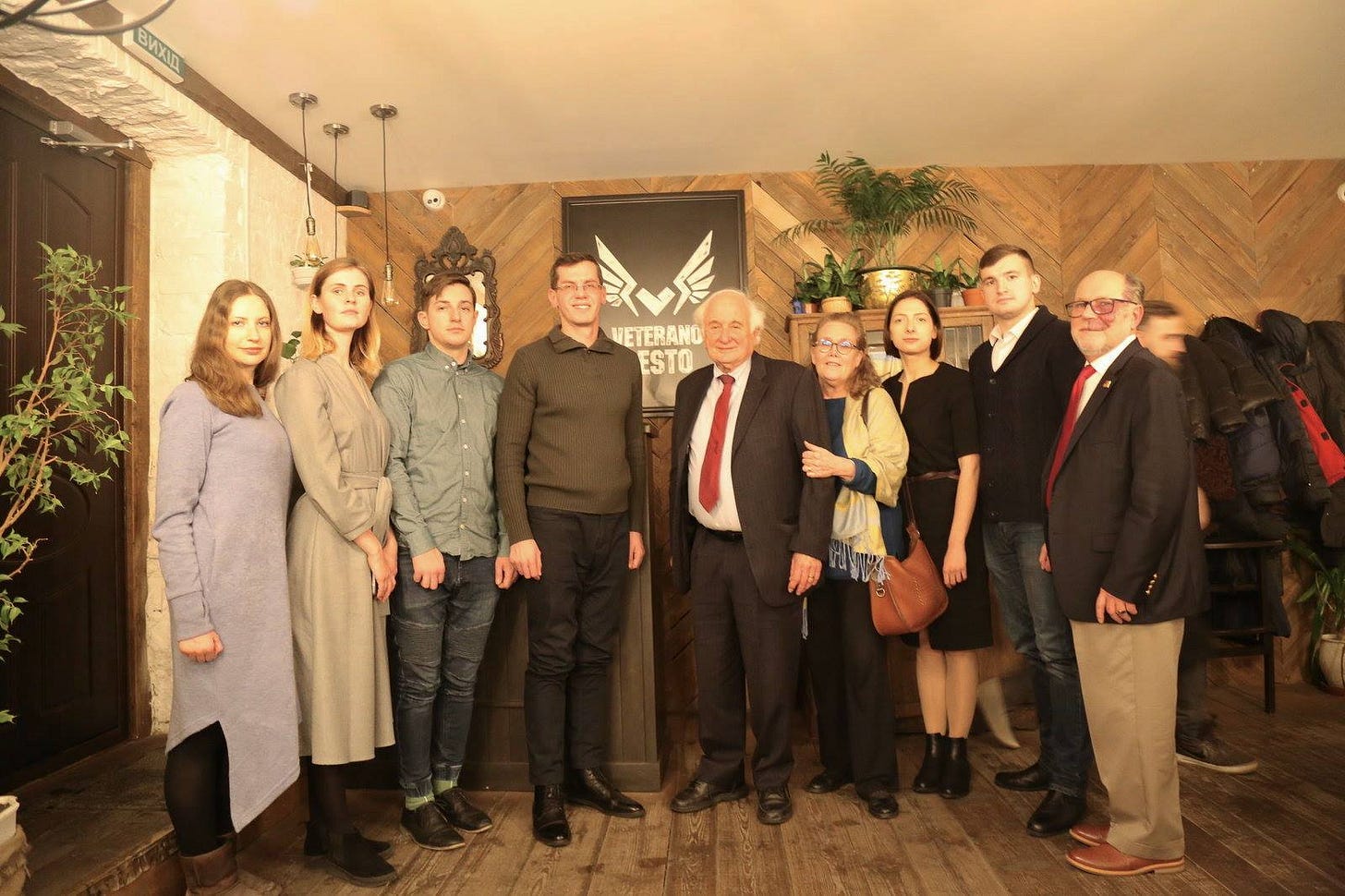
Apparently Serhii Kuzan feared that threatening Zelensky’s new government with another bloody “Maidan revolution” would invite Russian aggression by destabilizing the country. In 2020, he said the Kremlin’s main goal in Ukraine “is to create a total mistrust of the government within the Ukrainian population to provoke a real confrontation.” He suggested that one “cover” would be a “fake New Maidan — Moscow doesn’t care how they’d start it.” Furthermore, “old generation party leaders are trying to use Maidan’s rhetoric again to raise rebellion.” Presumably this included Petro Poroshenko, the former president (2014-19), and Andriy Parubiy, ex-chairman of Ukrainian parliament (2016-19), another leader of Poroshenko’s “European Solidarity” party, which was an important ally of the Capitulation Resistance Movement that essentially became the new incubator of “Free People” after Kuzan’s departure.
In early 2019, just after the organization held a congress without him and his closest associates, Serhii Kuzan announced that they were leaving Free People. According to them, “we have a different view on fundamental issues.” But it wasn’t an ugly break-up. Later that year, Dmytro Zhmailo accompanied OUN-B leader Stefan Romaniw to a meeting with Arsen Avakov, the powerful Interior Minister of Ukraine (2014-21), and the Kuzan team joined the OUN-B pilgrimage to Stepan Bandera’s grave in Munich for the 60th anniversary of his assassination. That being said, this small faction appears to have grown more distant from the rest of the Banderite network in Ukraine and kept to themselves in Munich. They were allegedly snubbed at the 14th Grand Assembly of OUN-B that took place in 2018 and re-elected Romaniw of Melbourne, Australia to a third term as OUN-B leader.
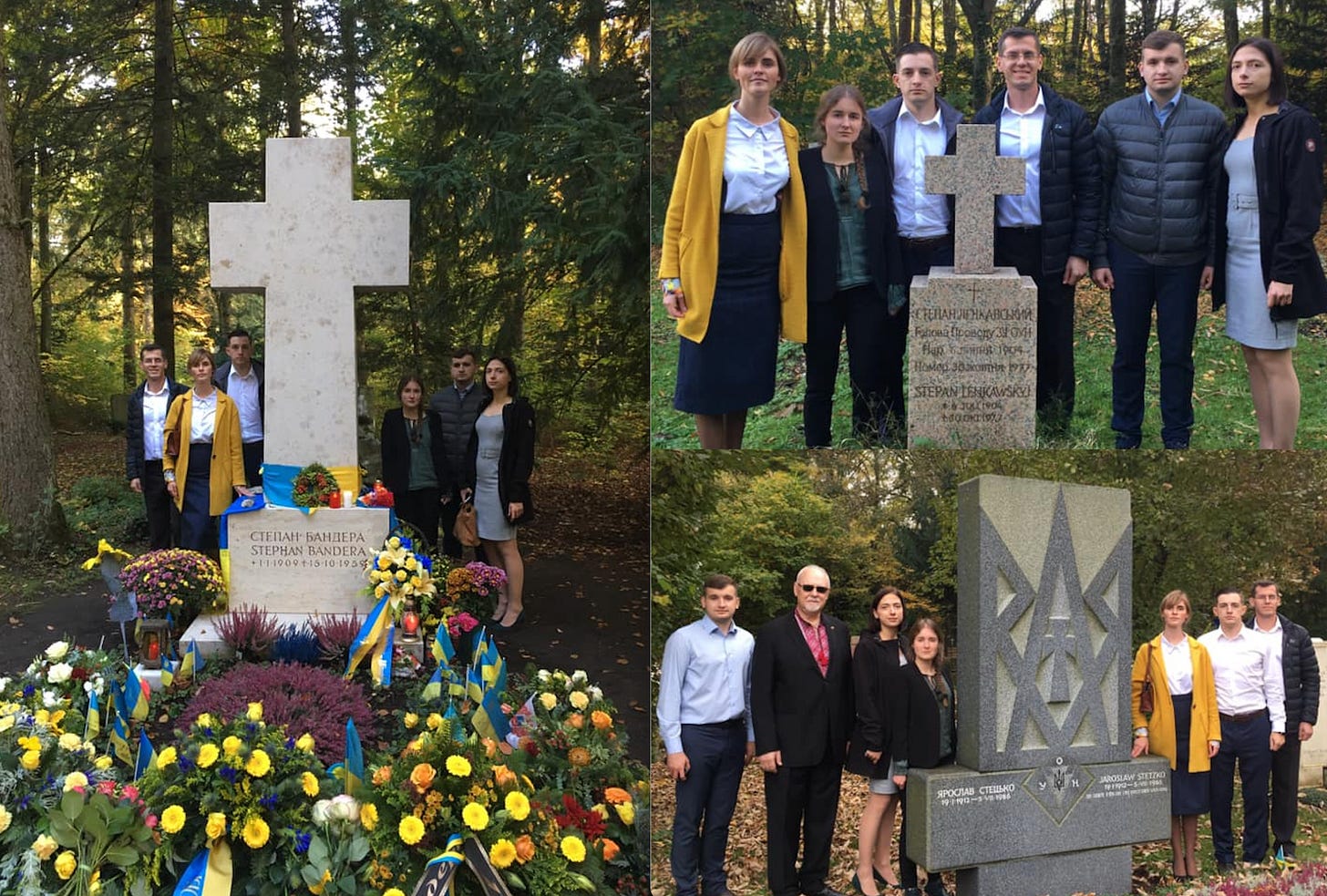
Since 2023, the OUN-B’s Ukrainian Information Service has republished some USCC press releases, but it seems that the Banderites in Ukraine did not welcome the news when their former rising star Serhiy Kuzan formed the Ukrainian Security and Cooperation Center. Perhaps the OUN-B was bitter about losing young talent that it cultivated for years to Kuzan’s (apparently independent) outfit, which is better connected to the Ukrainian military and Western media. For example,
Dmtryo Zhmailo—executive director of the USCC. He was surely considered to be a promising recruit to OUN-B as the deputy head of the MNK, chief of staff of Free People, a lead coordinator of the “Turn off Russian” and “Free Markiv” campaigns, and senior staff member to deputy OUN-B leader Oleh Medunytsia in the Ukrainian parliament.
Olesia Horiainova—USCC communications director. In 2017 she joined the MNK board of directors and participated in the Open World Program administered by the U.S. Congressional Office for International Leadership. She was also an advisor to OUN-B member Ulana Suprun, the acting Healthcare Minister of Ukraine (2016-19).
Solomiya Khoma—“Coordinator of International Cooperation” at USCC, and now a representative of the European Congress of Ukrainians, who also worked in Suprun’s Ministry. She met her husband, an MNK organizer and leader of the Plast scouting organization in Kyiv, at the MNK’s annual “athletic patriotic field game.” His uncle, the leader of the far-right “Congress of Ukrainian Nationalists” political party, married into the family of the late OUN-B leader Slava Stetsko.
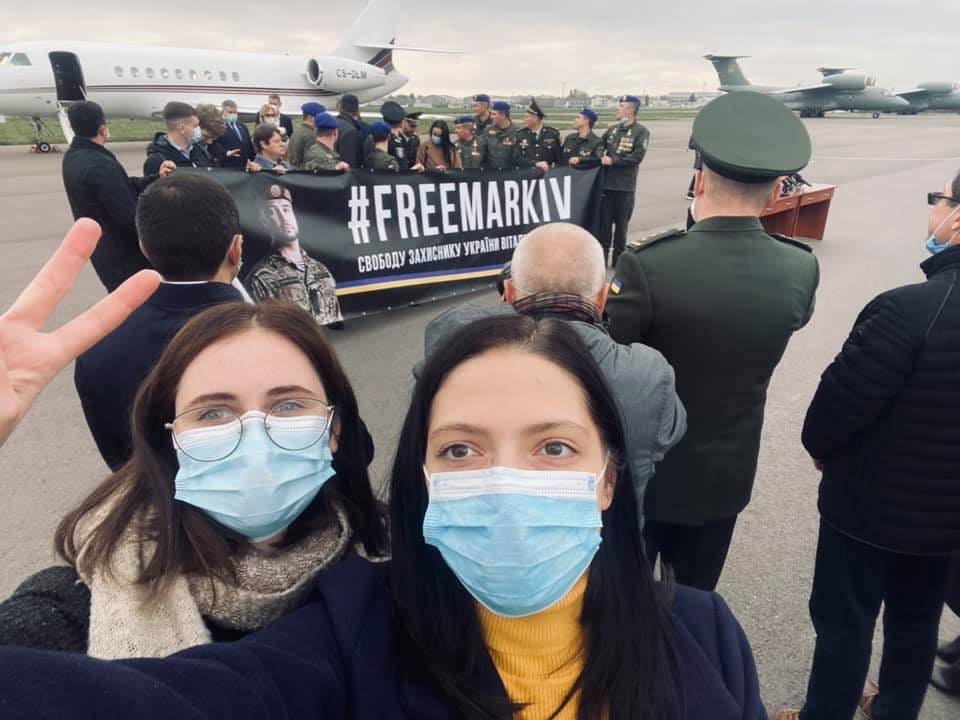

Rise of the USCC
In November 2021, with the threat of a Russian invasion looming, the USCC arranged a trip to the frontlines in eastern Ukraine for Nolan Peterson, an editor of the Black Rifle Coffee Company magazine and former Ukraine correspondent for the “Daily Signal” published by the far-right Heritage Foundation. Serhii Kuzan called this “another ‘Mission East,’” referring to an OUN-B initiative started by Stefan Romaniw of Australia around 2010. In the days of the “Free People Volunteer Network,” it was the name given to the trips that Canadian Banderites (such as Lubomyr Luciuk) made to the frontline areas, courtesy of the “Turn off Russian” team.

The League of Ukrainian Canadians and BCU Financial Group organized Nolan Peterson’s first book launch event in 2019. A month before the Russian invasion, he interviewed Andriy Levus. According to Peterson, “If Ukraine’s government falls after a Russian offensive, [Levus] plans on ‘going underground’ and organizing an armed resistance.” That interview was never published.
In early 2022 the USCC also arranged a trip to eastern Ukraine for The Guardian’s Luke Harding, the author of a 2017 book, “Collusion,” the story of “How Russia Helped Donald Trump Win.” Harding, a prominent journalist and Russiagate peddler who wrote a fake story about Julian Assange taking meetings with Paul Manafort, subsequently gave the Kuzan team shoutouts online. He became just the second person to follow the USCC on Twitter. In his 2022 book, “Invasion,” the acknowledgements section named Serhii Kuzan, Dmytro Zhmailo, Olesia Horiainova, and Volodymyr Yurchenko, the USCC’s Banderite videographer who worked with The Guardian multiple times that year.
Perhaps with a boost from Harding, in the spring of 2022 the USCC chairman started to be regularly quoted in major Western publications. Meanwhile, the organization forged an important connection to the HUR’s new Kraken unit based in Kharkiv, where Serhii Kuzan used to coordinate the Free People network. Kuzan doesn’t hail from Kharkiv, but Andriy Rudenko does. The latter is a former “Turn off Russian” activist from the MNK and Free People. He appears to coordinate the Kraken regiment’s “Support Group,” and maybe also the “Humanitarian Center Kharkiv” that has rebranded as “USCC humanitarian” on Facebook. According to Pete Shmigel, an Australian USCC supporter from a Banderite family, Rudenko is a “Kraken soldier who runs a humanitarian program” and is responsible for the neo-Nazi HUR unit’s cooperation with the center in Kharkiv.

According to the USCC, it was “one of the first who was collecting photo and video proofs of Russian crimes on just liberated territories of Kyiv, Kharkiv, and Kherson regions as well as on the front-line territories of Luhansk Donetsk regions.” For the one year anniversary of the Russian invasion, the USCC organized a photo exhibit and a small rally on the square in front of the United Nations complex in Geneva: “Year of Invincibility—the Point of No Return.” Interestingly, the OUN-B’s Ukrainian Information Service republished a press release from the USCC about this demonstration. It started to do the same for other USCC events.
A few months later, the USCC “coordinator of international cooperation” Solomiya Khoma attended the 14th congress of the European Congress of Ukrainians (ECU) in Berlin, which was organized with support from the International Centre for Migration Policy Development, the EU’s little-known “migration managers.” Serhii Kuzan likely joined Khoma, because the new vice president of the ECU from Serbia tagged them both in a Facebook post about the meeting. They bolstered the Banderite presence at the 2023 ECU congress, which admitted two new members, including the Christian Society of Ukrainians in Italy. This obscure organization is chaired by Oles Horodetsky, who became the OUN-B point man in Rome where he spearheaded the “Free Markiv” campaign. Overall, the Banderites have less influence in the ECU, but just enough. The ECU representatives on the executive committee of the Ukrainian World Congress are OUN-B members from Britain and Belgium.
Soon the ECU announced “the deepening of cooperation” with the USCC, including plans “to counter Russian influence in the world.” As a result, Solomiya Khoma became the ECU representative in Kyiv. That summer, the USCC held a couple of events with new friends from the Free Democratic Party (FDP) in Germany, which is reportedly facing extinction in future elections. At the first meeting in Munich about Russian sanctions, Serhii Kuzan spoke alongside Ulrich Lechte, the top FDP member from the foreign affairs committee in the German parliament. About a week later, the USCC held another event in Munich with FDP-linked foundations, this time about Russian culture as “one of the key elements of the hybrid war.” The Banderite speaker in this case was Alina Ponypaliak, the USCC’s resident “expert” on World War II, who is married to Dmytro Zhmailo and wrote a book in 2021 about the last commander of the OUN-B’s Ukrainian Insurgent Army.
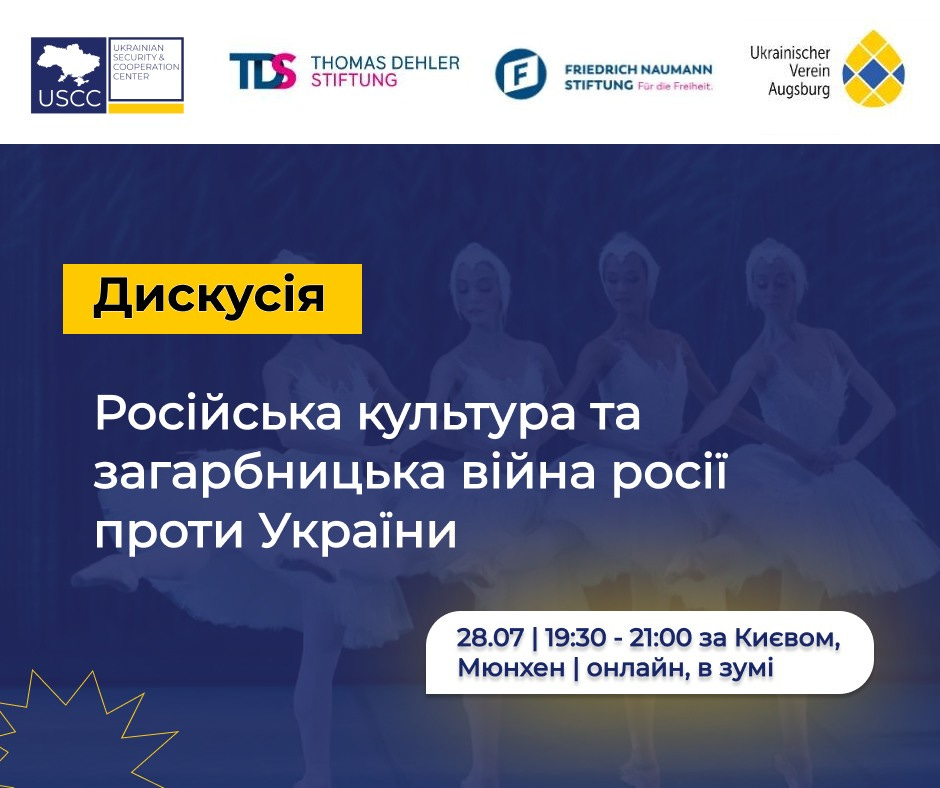
“Ukrainian refugees are the target of Russian propaganda.” Later that summer, the Ukraine Crisis Media Center in Kyiv hosted a discussion about this topic between the head of its Hybrid Warfare Analytical Group and Dmytro Zhmailo, the executive director of the USCC. By the end of the year, Solomiya Khoma spoke at a conference in Prague “dedicated to the strategy of countering Russian propaganda,” that the USCC organized with the ECU and the International Centre for Migration Policy Development. In November 2023, USCC leaders participated in similar events organized by their ECU allies in Romania and Ireland. At a symposium in Dublin, co-sponsored by the U.S. embassy and European Commission, Olesia Horiainova spoke alongside Karl Stoltz, a senior advisor to the Global Engagement Center, which is an agency in the State Department “tasked with countering foreign state and non-state propaganda and disinformation.”
To welcome 2024 as the year of the organization’s 75th anniversary, the European Congress of Ukrainian announced a series of online meetings, starting with USCC chairman Serhiy Kuzan. In February, Kuzan signed a memorandum of cooperation with the rector of the National Academy of the Security Service of Ukraine (SBU, Sluzhba Bezpeky Ukrainy). According to the USCC, “The document provides for the organization and conduct of joint research, preparation of scientific publications, educational projects, as well as the development of training programs in the field of countering Russian hybrid influences.” Within two months, Lubomyr Luciuk, a notorious defender of Ukrainian SS veterans in Canada, addressed students of the SBU academy, with Alina Ponypaliak from the USCC as his moderator.
In April, billionaire UK Conservative politician Lord Michael Ashcroft gave thanks to the USCC for “their great help” with an article he wrote for the Daily Mail about partisan resistance in Russian-occupied Ukraine. Around that time, Serhii Kuzan wrote an op-ed for the Kyiv Post in support of Ukraine’s very controversial new mobilization law. Later that spring, he warned, “Kremlin intensifies sabotage and propaganda in the West ahead of EU elections,” and suggested that Russian agents were responsible for artificially inflating Ukrainian resistance to mobilization, which is certainly on the rise as more and more people get rounded up as cannon fodder.
“We will not see the thousands of videos or cases where individuals willingly go and sign up to join the army,” said Kuzan, “but we will see a few videos of people who are resisting mobilization and those go viral.” Meanwhile, the USCC chairman wrote an op-ed for The Hill: “Ukraine doesn’t have a Nazi problem, but Russia sure does.” Earlier that year, Kuzan promoted a documentary about the HUR’s “Russian Volunteer Corps” which is led by Russian neo-Nazis from the Azov movement. That was surprising to see coming from a Banderite, but then again, this one is likely in cahoots with the HUR. In any case, the USCC team, and especially its chairman, have been extensively quoted by Western media over the past couple years—such as this summer by the Wall Street Journal editorial board about Ukraine’s incursion into Kursk, Russia. Another example from The Hill, “Ukraine pushes for long-range strikes as troops advance in Russia” (8/21/24):
Dmytro Zhmailo, executive director of the Ukrainian Security and Cooperation Center, said the “threat of escalation has actually no basis,” and that view has been reinforced by Ukrainian military intelligence.
Daniel Fried, a “distinguished fellow” at the Atlantic Council, and former Coordinator for Sanctions Policy in the State Department under Barack Obama, recently spoke to students at the SBU National Academy, with moderators from the USCC. Shortly after Biden took office in 2021, Fried told a conference organized by U.S. Banderite leaders, “It will not be a return to the Obama administration. It will be a return to the best [—in other words, the most hawkish—] sides of the Obama administration, without some of the disheartening debates that happened internally.” Fried was the co-author of an Atlantic Council policy paper, “Biden and Ukraine: A strategy for the new administration.” In December 2021, the journalist Leonid Ragozin observed, “For now, it seems that Biden is closely following its suggestions.”
I’ve been curious where this is all going. Will these Banderites just become lifelong think tankers? Perhaps the USCC-ECU partnership will help authorities (in Kyiv or EU) monitor Ukrainian refugees in Europe? Maybe Kuzan’s team is angling for a more important role in the intelligence community or a future government led by someone like Budanov? It could also be that the USCC is on its way back into the arms of OUN-B. But maybe it never really left?
The Banderites have largely faltered since 2022, and their “Resistance Movement” evaporated. As a Free People front, it apparently reverted to a volunteer network, while banking on getting credit for partisan activity in Russian-occupied Ukraine. The USCC, meanwhile, can take credit for all kinds of achievements. With its ties to the European Congress of Ukrainians, the Banderites might even need the USCC to retain a high level of influence in the Ukrainian World Congress for years to come, especially after the death of OUN-B leader Stefan Romaniw, who was a towering figure in the organization.
As I’m writing this, I see that Romaniw’s successor, OUN-B leader Oleh Medunytsia, just had a meeting with the rector of the SBU academy, and Serhii Kuzan has written an article for the Atlantic Council’s “UkraineAlert” blog, which claims, “Ukraine is slowly but steadily weakening Russia’s grip on Crimea.”

Apparently the Kuzan crew’s departure from Free People in 2019 had nothing to do with a feud among the Banderites in the United States that erupted later that year, but Serhii Kuzan voiced support for the losing side, which got steamrolled by the OUN-B “Land Leadership of America.” If Kuzan and his team felt unappreciated, they might have decided that it was best to go and do their own thing, so they can eventually come back and show what they have achieved with just a small group in order to make the argument that they are the new generation of Banderite leaders that should take over the international OUN-B network.
Thanks for reading. If you want to support my work, you can “Buy Me a Coffee.”



